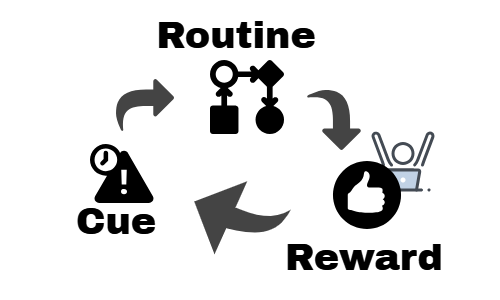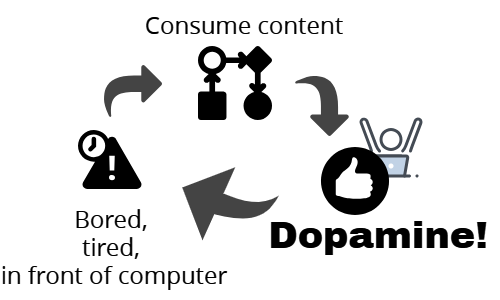We have spent the past decade under the sign of habit-forming technologies. Scroll down - get a dopamine hit. Your tweet was seen by another 100 people - one more. Binged an entire season of a new series? - oops.
The most significant successes that come to mind - Facebook, Twitter, Instagram, Netflix, Youtube - all base their achievements in creating a habitual interaction with their products. Habits themselves aren't inherently bad, of course. We base our existence on countless automatic patterns. However, is spending hours a day scrolling through neverending (and mostly never-valuable) content good for your health?
(The obvious and already well established answer is no)
Our operating system is easy to hijack. For human 1.0, all you need is a red blob popping up on the notification bar or an auto-play turned on by default.
Habits #
All habit-forming requires is a cue, routine, and reward.

As your brain figures out the connection between them, you get locked into an automatic pattern. That worked great for our ancestors, who were more concerned with staying alive than watching cat videos. And not so great for us when thousands of people work daily to get us hooked on their products with the same mechanisms.

The worst and best thing about habits is that we do them automatically. Life would be pretty dull if I had to decide which pocket to put my wallet in consciously. But when opening your laptop triggers a direct pathway to an infinite-scrolling website, we have a tremendous problem.
(You can read more about habits in the excellent "The power of habit" by Charles Duhigg)
Apple and Google to the rescue? #
Both Apple and Google recently revealed upcoming features for iOS and Android which aim at helping users manage their interactions with phones. Usage statistics, blocking apps by the time of day, limiting notifications, etc.
While those are far from revolutionary and don't seem to deliver much over 'just turning your goddamn phone off,' they prove there is enough pressure on digital wellbeing that companies which earn on screen time are willing to help users limit it. That's a good sign! Maybe movements like Time Well Spent and a rising tide of articles and books (The Shallows comes to mind) will slowly move us towards a more conscious future?
A low-tech alternative #
Time tracking isn't a new idea. Many apps and companies offer precisely that already. I wasn't delighted with the ones I tried before, mainly due to a tiny little issue I have with running borderline spyware on my devices.
So yes, getting statistics of my screen usage from built-in system functionality sounds amazing.
But before that makes its way to my phone, there is a straightforward exercise that I run from time to time which helps me notice unwanted patterns in my life:
- Print out a time log for two days
- Every 15 minutes, write down what you were doing
After two days:
- Be surprised
- Ask yourself is this consistent with your self-perception - and what you want to change
It works wonders for me, and a few guinea pigs people I forced kindly motivated to try it - without depending on a tech giant to solve my problems.
There seems to be also a whole movement and a book by Laura Vanderkam ("168 hours") based on radical time tracking, but I haven't yet gotten around to digging deeper into it.
Peak bad habit #
I wonder if we will see more news about digital monopolies taking action to limit their habit-forming impact. If the social pendulum swings back from digitized life back to reality, we all would be better off. But in a world where competition for our attention is a zero-sum game for tech giants, there are good reasons to remain skeptical, even in the face of the first good signs.
Still, there is always the personal choice to pull the plug on any service you know you spend too much time on.
He is free who lives as he wishes to live; who is neither subject to compulsion nor to hindrance, nor to force; whose movements to action are not impeded, whose desires attain their purpose, and who does not fall into that which he would avoid.